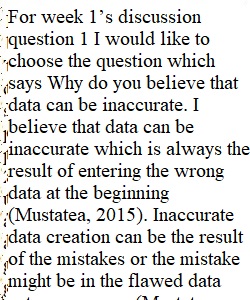


Q Must post first. As you know, case studies are the best way to apply textbook knowledge to real-life events. In our case, case studies will provide you with a biased-free overview of an event (or situation) that has already taken place. Having said that, we will use questions for "Closing Case 1" for our Discussion 1 and "Closing Case #2" for Discussion 2 - Every week! Please refer to Chapter 1's Closing Case 1 (Do You Trust Your Data?, pg. 38) and answer any ONE of the questions below in your initial thread before Wednesday. Before the end of Sunday, interact with at least TWO other classmates by either asking probing question(s), agreeing with their answers, or offering alternative points of view. Either way, your replies must be substantive and through-provoking to earn full credit for your participation. Questions: 1. Why do you believe data can be inaccurate? 2. What can a business do to ensure data is correct? 3. Explain how bad data will impact information, business intelligence, and knowledge. 4. Have you ever made a decision based on bad data? If so, be sure to share it with your peers and explain how you could have verified the data quality. 5. Argue for or against the following statement: "It is better to make a business decision with bad data than with no data.
View Related Questions